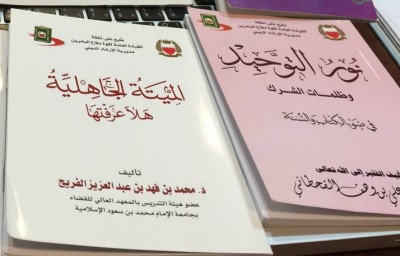
Prominent Bahraini human rights defender Nabeel Rajab to stand trial on March 15. Photograph by Majeed Tareef. Copyright: Demotix
Leading Bahraini human rights defender Nabeel Rajab will today learn his fate following his appeal against a six-month prison sentence handed to him by a Bahraini court in January. The case concerns comments he made about ISIS on Twitter. Rajab was initially convicted of “denigrating an official body” in tweets that likened Bahrain's security apparatus to an “incubator” for fighters of the radical group ISIS.
Rajab, who heads the Bahrain Centre for Human Rights — not recognised as a legal entity by the government — was only released from prison in May 2014 after serving two years for “disrupting the public order.”
That sentence came after Rajab was arrested for trying to investigate human rights violations that took place during Bahrain's popular uprising in 2011.
The tweet for which he was convicted suggested that Bahrain's security institutions had a number of staff that had joined terrorist groups, including ISIS. In January 2015, Bahrain revoked the citizenship of a number of people accused of membership of the group.
Along with a number of dissidents, these included high profile figures such as a former officer, Muhamed Al-binali, who joined ISIS, and Salman Alkhalifa, a member of the royal family. The revocations represented a worrying indication of ISIS’ infiltration of the Bahraini state.
The Bahrain Centre for Human Rights (BCHR) has had many disputes with Bahraini security forces even before the 2011 uprising. In 2004, the centre was formally liquidated by the government but has continued to remain active.
Governing by sectarianism
On numerous occasions BCHR has complained about sectarian discrimination in the security forces, which the country's Shia population — the majority of the country — are excluded from joining by the Sunni government.

The government even resorts to manipulated Islamic literature to promote sectarianism and justify its suppression of protestors.
Books that are branded as ‘religious’ are printed and distributed by the Bahrain Defence Forces. They openly call for killing protestors who are against the ‘ruler’. Protesters and people who practice Shia traditions are outrageously described as apostates in these books.
The first book, on the left of the image above, is entitled ‘The Pagan's Death, How Would you Define it?’ and is authored by Mohamed Fahad Abdulaziz alfuraih. One excerpt from the book reads:
“ان مفارقة الجماعة، ومحاولة تفريقها من كبائر الذنوب، وصاحبها مستحق للقتل. ”
“ومن عدَّ المساوئ فقد أعان على الظلم، وملأ القلوب بما لا يجوز، أخرج ابن أبي شيبة أن عبدالله بن حكيم رحمه الله قال: (لا أعين على قتل خليفة بعد عثمان أبدا فقيل له: أعنت على دمه؟ قال: إني أعد ذكر مساوئه عونا على دمه).
إن تكوين المظاهرات، وتنظيم المسيرات وتحاشد الجهلة وغوغاء الناس في الطرق العامة ونحوها نوع من أنواع الخروج على الحاكم المسلم، وضرب من أضرب مفارقة الجماعة، فاعلها داخل في عِقْد الخوارج، والرضى بها كالفاعل، والمحرض عليها أعظمهم جرما، وأشدهم خبثا، ولو كان تحريضه بكلمة قالها، أو بجملة خطها. “
Parting from the group and creating factionalism is a mortal sin. Anyone who commits that deserves to be killed.
[…]
The formation of protests, organizing marches and the gathering of ignorant mobs in public roads and other forms of dissent against the ruler is a form of parting from the group. Whoever does so is considered an apostate. Whoever agrees with that is as guilty as the perpetrator and the inciter is the most sinful among them and most devious, whether he incited this by a word he said or a line he wrote.
The book on the right in the image is titled ‘The Lights of Sunnah and the Darkness of Heresy’. It includes the following paragraphs:
فكل من دعا مَيِّتاً، أو غائباً: من الأنبياء، والصالحين، سواء كان بلفظ الاستغاثة، أو غيرها فقد فعل الشرك الأكبر الذي لا يغفره الله إلا بالتوبة منه، فكل من غلا في نبي، أو رجل صالح، وجعل فيه نوعاً من العبادة مثل أن يقول: يا سيدي فلان انصرني، أو أعني، أو أغثني، أو ارزقني، أو أنا في حسبك، ونحو هذه الأقوال، فكل هذا شرك وضلال يُستتاب صاحبه، فإن تاب وإلا قُتل
Everyone who pleads to a dead or missing person, may that person be a prophet or pious person, whether he was calling for help or otherwise, has committed infidelity which will not be forgiven by Allah and should repent. Everyone who praises – more than one should – a prophet or a pious man and links it to some sort of worship like saying: “my Master [X] help me” or “I'm in your guardianship” and so on has committed infidelity and should repent or otherwise be killed.
This paragraph is a provocation against Shia Muslims who plead to Prophet Mohammed and his decedents when faced with adversity.
وقال شيخ الإسلام في حكم الطواف بغير الكعبة:((وأما الطواف بذلك فهو من أعظم البدع المحرمة، ومن اتخذه ديناً يُستتاب، فإن تاب وإلا قُتل))(1).
The highest cleric (Ibn Taymya, the founder of Salafism) said pilgrimage to places other than Mecca is one of the greatest acts of heresy and who ever makes that a part of his belief should repent or be killed.
This is another provocation against the country's majority Shia population. Shia Muslims perform pilgrimage to many sites besides Mecca, including holy shrines in Iraq, Syria and Iran.
The type of sectarian speech found in these books is similar to that used by ISIS. The books often quote “selected” teachings of the controversial 13th century Islamic scholar Ibn Taymmiya. ISIS also likes to cite Taymmiya, as the group did recently in the execution of the Jordanian pilot.
Taymmiya is a major influence on modern day Wahhabism and was even quoted by Osama bin Laden. Taymiyyah was imprisoned multiple times during his life, often for protesting against government authorities. He died in prison.
Where next for Bahrain's suffering Shia majority?
Manipulative and inflammatory sectarian indoctrination is not uncommon amongst high ranking officials in the security forces. The official spokesperson for the army Khalid Al BouAinain previously tweeted about how “cats can enter his university but not the Shia”.

Such comments go unpunished. Back in 2011, Bahraini Shias complained of political and economic marginalization in the country of 1.3 million people. Recent events suggest that trend is only increasing.
The military cracked down on Shia Muslim-led protests against the government in 2011. Since then, Bahrain has been accused of human rights abuses targeting Shias by both local human rights defenders such as Nabeel Rajab and international rights organisations.
In the meantime, low-level protests have continued to simmer. According to Mark Lynch at Foreign Policy magazine in 2011, “the Bahraini regime responded not only with violent force, but also by encouraging a nasty sectarianism in order to divide the popular movement and to build domestic and regional support for a crackdown.”
Another tactic the government has used to fuel sectarianism has been the empowerment of preachers from the country's small extremist Salafist population. Besides being anti-Shia, Salafism is a puritanical Sunni sect that has inspired extremist militant organisations like Al-Qaeda and ISIS.
While Nabeel Rajab, a known pacifist and one of the few in the country who still speaks out openly against Bahrain's destructive sectarianism, faces punishment for stating what many see as obvious, those preaching hatred towards protestors and the country's Shia population seem to enjoy unlimited freedom.
Also Read:
Bahrain's Prominent Human Rights Activist Arrested for Criticizing Police Defectors Who Joined ISIS
Bahrain Joins US Air Strikes, but Still Tortures Americans and Silences ISIS Critics
Bahrain's Shia Muslims Tense as Politicians and Preachers Pledge Allegiance to ISIS








6 comments